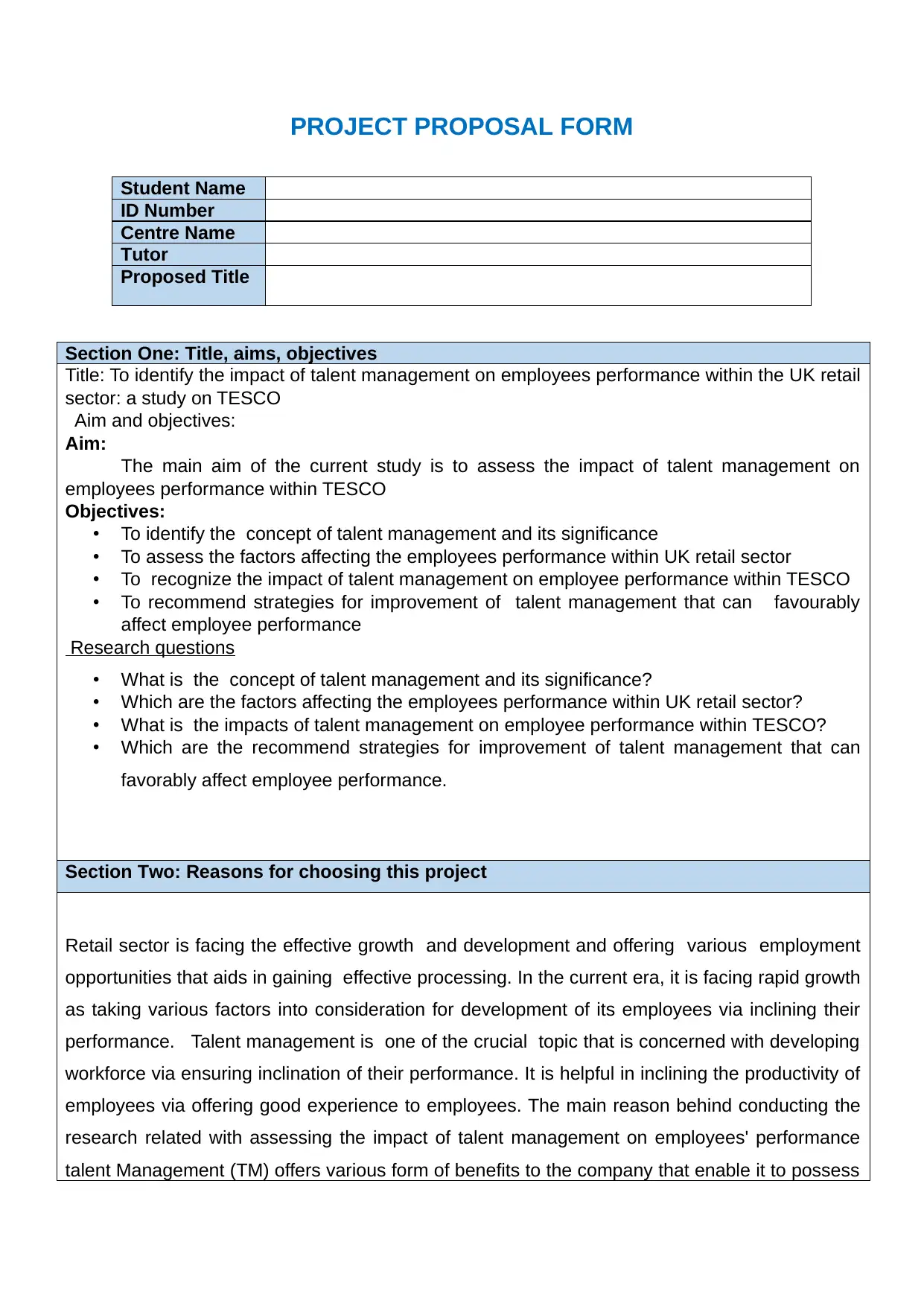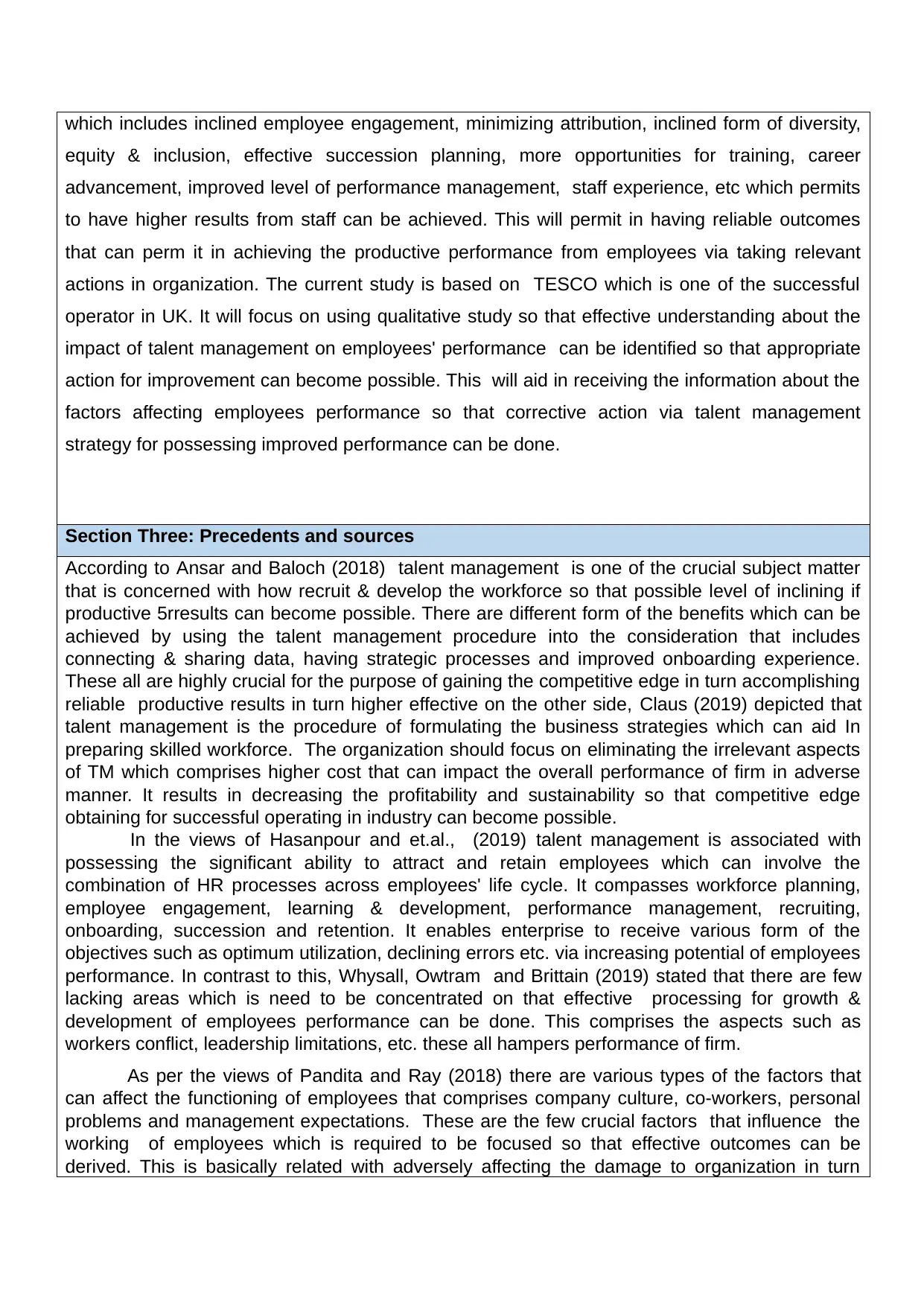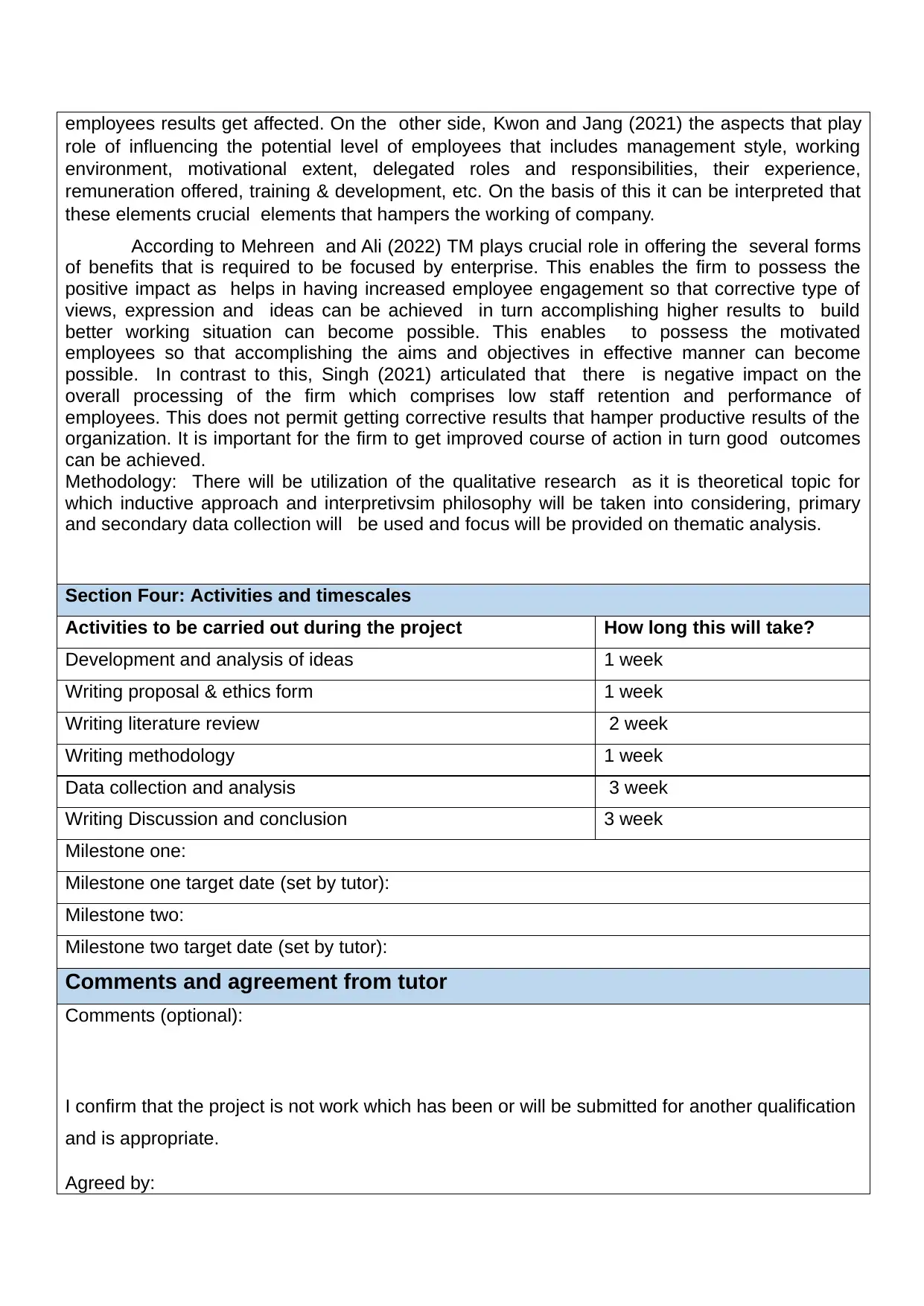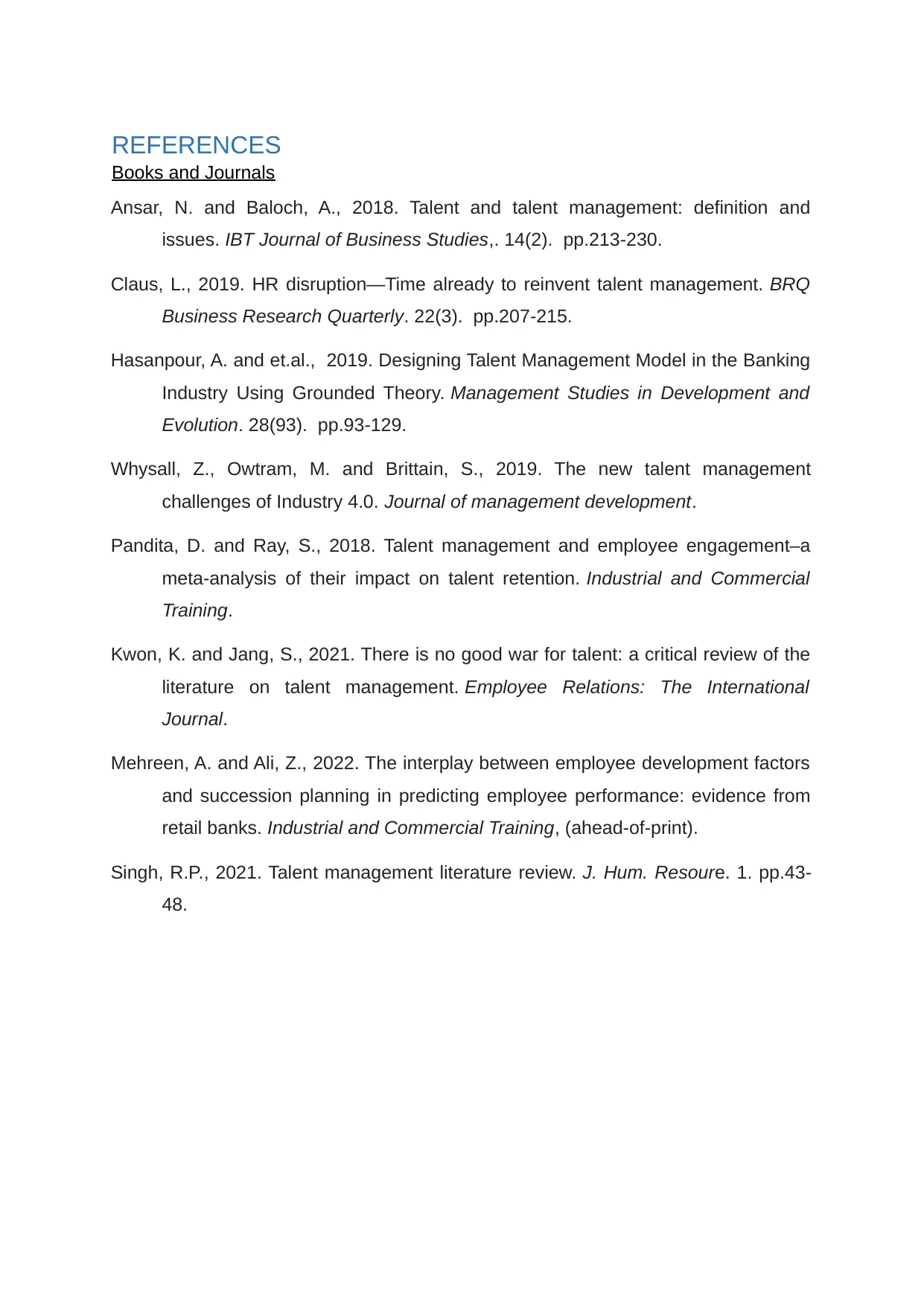Assessing Talent Management's Impact on Employee Performance: TESCO
VerifiedAdded on 2023/06/10
|5
|1524
|229
Project
AI Summary
This project proposal outlines a study on the impact of talent management on employee performance within TESCO, a major UK retailer. The research aims to identify the concept and significance of talent management, assess factors affecting employee performance in the UK retail sector, recognize the impact of talent management on employee performance specifically at TESCO, and recommend strategies for improvement. The proposal includes a detailed literature review, exploring various perspectives on talent management, its benefits (such as increased employee engagement and retention), and the factors influencing employee performance. The methodology involves qualitative research using primary and secondary data and thematic analysis. The project timeline outlines activities such as idea development, literature review, data collection, and analysis. The study seeks to provide insights into how talent management strategies can be optimized to enhance employee performance and overall business outcomes within the retail sector, with a specific focus on TESCO's operations.

PROJECT PROPOSAL FORM
Student Name
ID Number
Centre Name
Tutor
Proposed Title
Section One: Title, aims, objectives
Title: To identify the impact of talent management on employees performance within the UK retail
sector: a study on TESCO
Aim and objectives:
Aim:
The main aim of the current study is to assess the impact of talent management on
employees performance within TESCO
Objectives:
• To identify the concept of talent management and its significance
• To assess the factors affecting the employees performance within UK retail sector
• To recognize the impact of talent management on employee performance within TESCO
• To recommend strategies for improvement of talent management that can favourably
affect employee performance
Research questions
• What is the concept of talent management and its significance?
• Which are the factors affecting the employees performance within UK retail sector?
• What is the impacts of talent management on employee performance within TESCO?
• Which are the recommend strategies for improvement of talent management that can
favorably affect employee performance.
Section Two: Reasons for choosing this project
Retail sector is facing the effective growth and development and offering various employment
opportunities that aids in gaining effective processing. In the current era, it is facing rapid growth
as taking various factors into consideration for development of its employees via inclining their
performance. Talent management is one of the crucial topic that is concerned with developing
workforce via ensuring inclination of their performance. It is helpful in inclining the productivity of
employees via offering good experience to employees. The main reason behind conducting the
research related with assessing the impact of talent management on employees' performance
talent Management (TM) offers various form of benefits to the company that enable it to possess
Student Name
ID Number
Centre Name
Tutor
Proposed Title
Section One: Title, aims, objectives
Title: To identify the impact of talent management on employees performance within the UK retail
sector: a study on TESCO
Aim and objectives:
Aim:
The main aim of the current study is to assess the impact of talent management on
employees performance within TESCO
Objectives:
• To identify the concept of talent management and its significance
• To assess the factors affecting the employees performance within UK retail sector
• To recognize the impact of talent management on employee performance within TESCO
• To recommend strategies for improvement of talent management that can favourably
affect employee performance
Research questions
• What is the concept of talent management and its significance?
• Which are the factors affecting the employees performance within UK retail sector?
• What is the impacts of talent management on employee performance within TESCO?
• Which are the recommend strategies for improvement of talent management that can
favorably affect employee performance.
Section Two: Reasons for choosing this project
Retail sector is facing the effective growth and development and offering various employment
opportunities that aids in gaining effective processing. In the current era, it is facing rapid growth
as taking various factors into consideration for development of its employees via inclining their
performance. Talent management is one of the crucial topic that is concerned with developing
workforce via ensuring inclination of their performance. It is helpful in inclining the productivity of
employees via offering good experience to employees. The main reason behind conducting the
research related with assessing the impact of talent management on employees' performance
talent Management (TM) offers various form of benefits to the company that enable it to possess
Paraphrase This Document
Need a fresh take? Get an instant paraphrase of this document with our AI Paraphraser

which includes inclined employee engagement, minimizing attribution, inclined form of diversity,
equity & inclusion, effective succession planning, more opportunities for training, career
advancement, improved level of performance management, staff experience, etc which permits
to have higher results from staff can be achieved. This will permit in having reliable outcomes
that can perm it in achieving the productive performance from employees via taking relevant
actions in organization. The current study is based on TESCO which is one of the successful
operator in UK. It will focus on using qualitative study so that effective understanding about the
impact of talent management on employees' performance can be identified so that appropriate
action for improvement can become possible. This will aid in receiving the information about the
factors affecting employees performance so that corrective action via talent management
strategy for possessing improved performance can be done.
Section Three: Precedents and sources
According to Ansar and Baloch (2018) talent management is one of the crucial subject matter
that is concerned with how recruit & develop the workforce so that possible level of inclining if
productive 5rresults can become possible. There are different form of the benefits which can be
achieved by using the talent management procedure into the consideration that includes
connecting & sharing data, having strategic processes and improved onboarding experience.
These all are highly crucial for the purpose of gaining the competitive edge in turn accomplishing
reliable productive results in turn higher effective on the other side, Claus (2019) depicted that
talent management is the procedure of formulating the business strategies which can aid In
preparing skilled workforce. The organization should focus on eliminating the irrelevant aspects
of TM which comprises higher cost that can impact the overall performance of firm in adverse
manner. It results in decreasing the profitability and sustainability so that competitive edge
obtaining for successful operating in industry can become possible.
In the views of Hasanpour and et.al., (2019) talent management is associated with
possessing the significant ability to attract and retain employees which can involve the
combination of HR processes across employees' life cycle. It compasses workforce planning,
employee engagement, learning & development, performance management, recruiting,
onboarding, succession and retention. It enables enterprise to receive various form of the
objectives such as optimum utilization, declining errors etc. via increasing potential of employees
performance. In contrast to this, Whysall, Owtram and Brittain (2019) stated that there are few
lacking areas which is need to be concentrated on that effective processing for growth &
development of employees performance can be done. This comprises the aspects such as
workers conflict, leadership limitations, etc. these all hampers performance of firm.
As per the views of Pandita and Ray (2018) there are various types of the factors that
can affect the functioning of employees that comprises company culture, co-workers, personal
problems and management expectations. These are the few crucial factors that influence the
working of employees which is required to be focused so that effective outcomes can be
derived. This is basically related with adversely affecting the damage to organization in turn
equity & inclusion, effective succession planning, more opportunities for training, career
advancement, improved level of performance management, staff experience, etc which permits
to have higher results from staff can be achieved. This will permit in having reliable outcomes
that can perm it in achieving the productive performance from employees via taking relevant
actions in organization. The current study is based on TESCO which is one of the successful
operator in UK. It will focus on using qualitative study so that effective understanding about the
impact of talent management on employees' performance can be identified so that appropriate
action for improvement can become possible. This will aid in receiving the information about the
factors affecting employees performance so that corrective action via talent management
strategy for possessing improved performance can be done.
Section Three: Precedents and sources
According to Ansar and Baloch (2018) talent management is one of the crucial subject matter
that is concerned with how recruit & develop the workforce so that possible level of inclining if
productive 5rresults can become possible. There are different form of the benefits which can be
achieved by using the talent management procedure into the consideration that includes
connecting & sharing data, having strategic processes and improved onboarding experience.
These all are highly crucial for the purpose of gaining the competitive edge in turn accomplishing
reliable productive results in turn higher effective on the other side, Claus (2019) depicted that
talent management is the procedure of formulating the business strategies which can aid In
preparing skilled workforce. The organization should focus on eliminating the irrelevant aspects
of TM which comprises higher cost that can impact the overall performance of firm in adverse
manner. It results in decreasing the profitability and sustainability so that competitive edge
obtaining for successful operating in industry can become possible.
In the views of Hasanpour and et.al., (2019) talent management is associated with
possessing the significant ability to attract and retain employees which can involve the
combination of HR processes across employees' life cycle. It compasses workforce planning,
employee engagement, learning & development, performance management, recruiting,
onboarding, succession and retention. It enables enterprise to receive various form of the
objectives such as optimum utilization, declining errors etc. via increasing potential of employees
performance. In contrast to this, Whysall, Owtram and Brittain (2019) stated that there are few
lacking areas which is need to be concentrated on that effective processing for growth &
development of employees performance can be done. This comprises the aspects such as
workers conflict, leadership limitations, etc. these all hampers performance of firm.
As per the views of Pandita and Ray (2018) there are various types of the factors that
can affect the functioning of employees that comprises company culture, co-workers, personal
problems and management expectations. These are the few crucial factors that influence the
working of employees which is required to be focused so that effective outcomes can be
derived. This is basically related with adversely affecting the damage to organization in turn

employees results get affected. On the other side, Kwon and Jang (2021) the aspects that play
role of influencing the potential level of employees that includes management style, working
environment, motivational extent, delegated roles and responsibilities, their experience,
remuneration offered, training & development, etc. On the basis of this it can be interpreted that
these elements crucial elements that hampers the working of company.
According to Mehreen and Ali (2022) TM plays crucial role in offering the several forms
of benefits that is required to be focused by enterprise. This enables the firm to possess the
positive impact as helps in having increased employee engagement so that corrective type of
views, expression and ideas can be achieved in turn accomplishing higher results to build
better working situation can become possible. This enables to possess the motivated
employees so that accomplishing the aims and objectives in effective manner can become
possible. In contrast to this, Singh (2021) articulated that there is negative impact on the
overall processing of the firm which comprises low staff retention and performance of
employees. This does not permit getting corrective results that hamper productive results of the
organization. It is important for the firm to get improved course of action in turn good outcomes
can be achieved.
Methodology: There will be utilization of the qualitative research as it is theoretical topic for
which inductive approach and interpretivsim philosophy will be taken into considering, primary
and secondary data collection will be used and focus will be provided on thematic analysis.
Section Four: Activities and timescales
Activities to be carried out during the project How long this will take?
Development and analysis of ideas 1 week
Writing proposal & ethics form 1 week
Writing literature review 2 week
Writing methodology 1 week
Data collection and analysis 3 week
Writing Discussion and conclusion 3 week
Milestone one:
Milestone one target date (set by tutor):
Milestone two:
Milestone two target date (set by tutor):
Comments and agreement from tutor
Comments (optional):
I confirm that the project is not work which has been or will be submitted for another qualification
and is appropriate.
Agreed by:
role of influencing the potential level of employees that includes management style, working
environment, motivational extent, delegated roles and responsibilities, their experience,
remuneration offered, training & development, etc. On the basis of this it can be interpreted that
these elements crucial elements that hampers the working of company.
According to Mehreen and Ali (2022) TM plays crucial role in offering the several forms
of benefits that is required to be focused by enterprise. This enables the firm to possess the
positive impact as helps in having increased employee engagement so that corrective type of
views, expression and ideas can be achieved in turn accomplishing higher results to build
better working situation can become possible. This enables to possess the motivated
employees so that accomplishing the aims and objectives in effective manner can become
possible. In contrast to this, Singh (2021) articulated that there is negative impact on the
overall processing of the firm which comprises low staff retention and performance of
employees. This does not permit getting corrective results that hamper productive results of the
organization. It is important for the firm to get improved course of action in turn good outcomes
can be achieved.
Methodology: There will be utilization of the qualitative research as it is theoretical topic for
which inductive approach and interpretivsim philosophy will be taken into considering, primary
and secondary data collection will be used and focus will be provided on thematic analysis.
Section Four: Activities and timescales
Activities to be carried out during the project How long this will take?
Development and analysis of ideas 1 week
Writing proposal & ethics form 1 week
Writing literature review 2 week
Writing methodology 1 week
Data collection and analysis 3 week
Writing Discussion and conclusion 3 week
Milestone one:
Milestone one target date (set by tutor):
Milestone two:
Milestone two target date (set by tutor):
Comments and agreement from tutor
Comments (optional):
I confirm that the project is not work which has been or will be submitted for another qualification
and is appropriate.
Agreed by:
⊘ This is a preview!⊘
Do you want full access?
Subscribe today to unlock all pages.

Trusted by 1+ million students worldwide

Tutor name: Date:
Paraphrase This Document
Need a fresh take? Get an instant paraphrase of this document with our AI Paraphraser

REFERENCES
Books and Journals
Ansar, N. and Baloch, A., 2018. Talent and talent management: definition and
issues. IBT Journal of Business Studies,. 14(2). pp.213-230.
Claus, L., 2019. HR disruption—Time already to reinvent talent management. BRQ
Business Research Quarterly. 22(3). pp.207-215.
Hasanpour, A. and et.al., 2019. Designing Talent Management Model in the Banking
Industry Using Grounded Theory. Management Studies in Development and
Evolution. 28(93). pp.93-129.
Whysall, Z., Owtram, M. and Brittain, S., 2019. The new talent management
challenges of Industry 4.0. Journal of management development.
Pandita, D. and Ray, S., 2018. Talent management and employee engagement–a
meta-analysis of their impact on talent retention. Industrial and Commercial
Training.
Kwon, K. and Jang, S., 2021. There is no good war for talent: a critical review of the
literature on talent management. Employee Relations: The International
Journal.
Mehreen, A. and Ali, Z., 2022. The interplay between employee development factors
and succession planning in predicting employee performance: evidence from
retail banks. Industrial and Commercial Training, (ahead-of-print).
Singh, R.P., 2021. Talent management literature review. J. Hum. Resoure. 1. pp.43-
48.
Books and Journals
Ansar, N. and Baloch, A., 2018. Talent and talent management: definition and
issues. IBT Journal of Business Studies,. 14(2). pp.213-230.
Claus, L., 2019. HR disruption—Time already to reinvent talent management. BRQ
Business Research Quarterly. 22(3). pp.207-215.
Hasanpour, A. and et.al., 2019. Designing Talent Management Model in the Banking
Industry Using Grounded Theory. Management Studies in Development and
Evolution. 28(93). pp.93-129.
Whysall, Z., Owtram, M. and Brittain, S., 2019. The new talent management
challenges of Industry 4.0. Journal of management development.
Pandita, D. and Ray, S., 2018. Talent management and employee engagement–a
meta-analysis of their impact on talent retention. Industrial and Commercial
Training.
Kwon, K. and Jang, S., 2021. There is no good war for talent: a critical review of the
literature on talent management. Employee Relations: The International
Journal.
Mehreen, A. and Ali, Z., 2022. The interplay between employee development factors
and succession planning in predicting employee performance: evidence from
retail banks. Industrial and Commercial Training, (ahead-of-print).
Singh, R.P., 2021. Talent management literature review. J. Hum. Resoure. 1. pp.43-
48.
1 out of 5
Related Documents
Your All-in-One AI-Powered Toolkit for Academic Success.
+13062052269
info@desklib.com
Available 24*7 on WhatsApp / Email
![[object Object]](/_next/static/media/star-bottom.7253800d.svg)
Unlock your academic potential
Copyright © 2020–2025 A2Z Services. All Rights Reserved. Developed and managed by ZUCOL.





